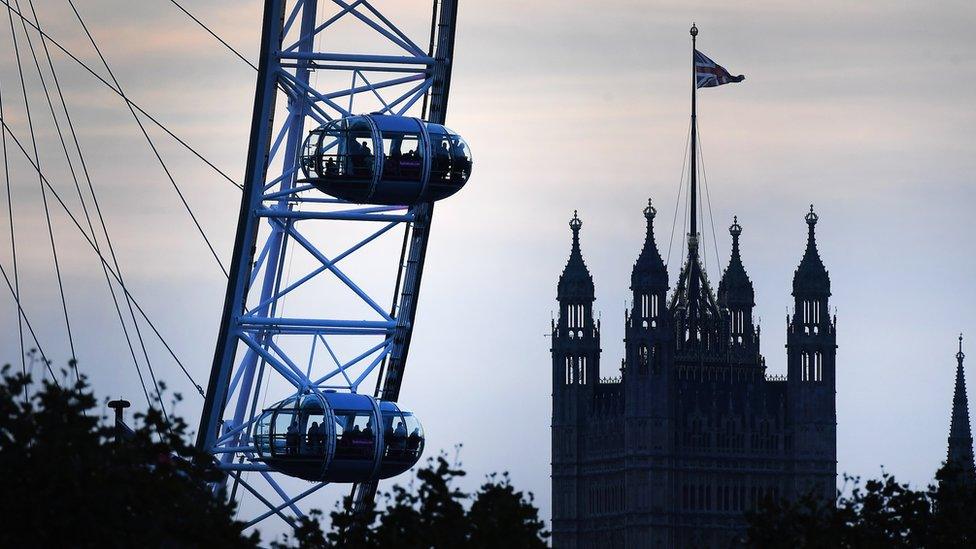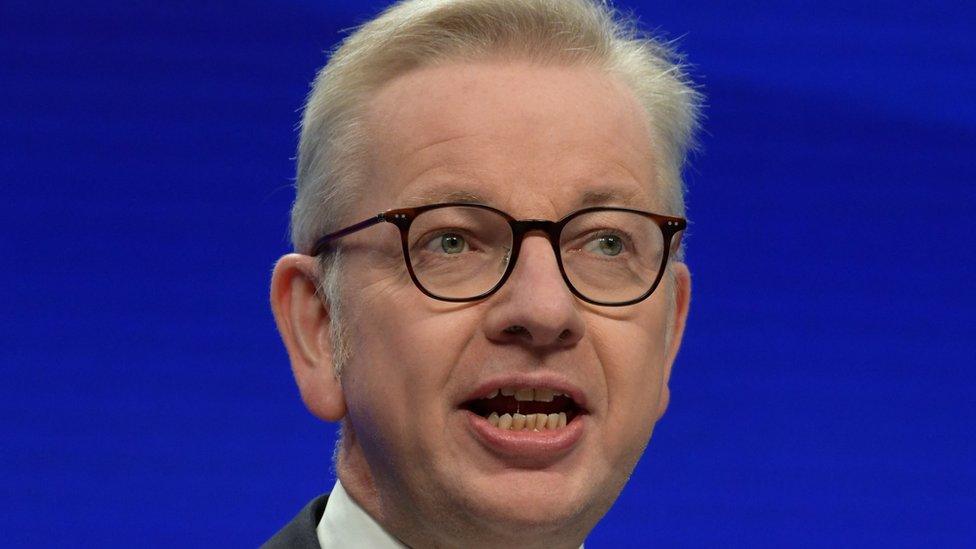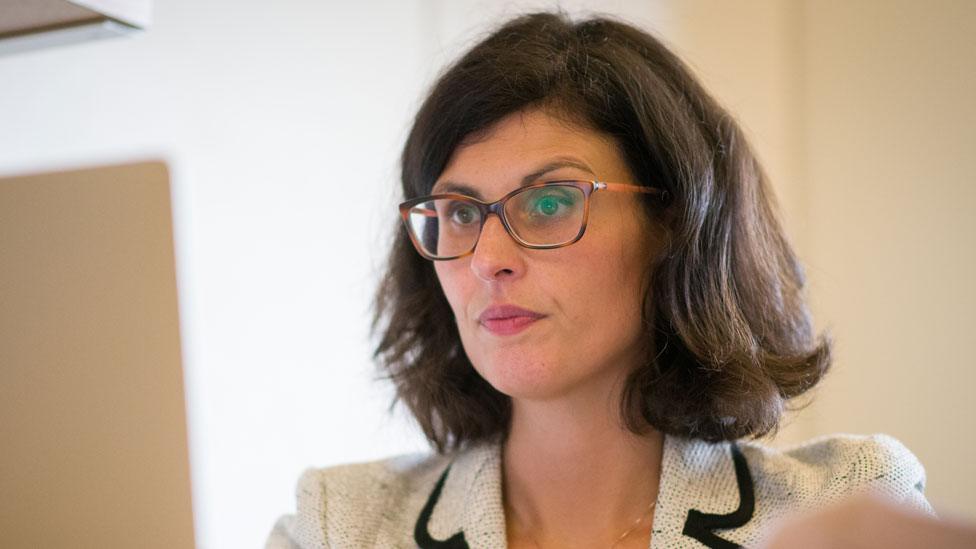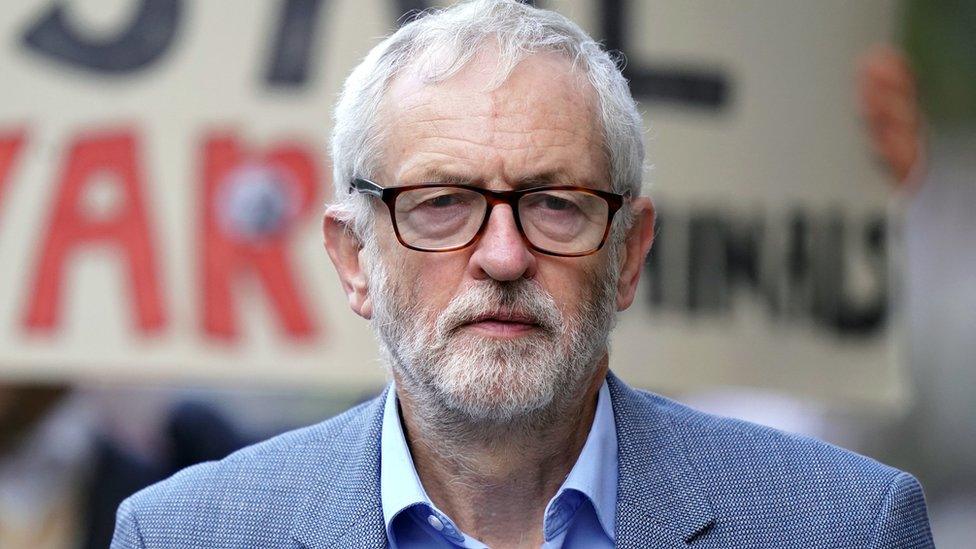The week ahead in Parliament
- Published

Week two of a Budget debate is often when MPs and others, having pored over the detail, uncover some awkward fact or hidden booby trap.
Remember George Osborne's "Omnishambles" Budget and the Pasty Tax? Philip Hammond's handbrake turn on National Insurance for the self-employed? Or the slow realisation by Gordon Brown and Alistair Darling about the implications of abolishing the 10p band of Income Tax?
Perhaps a Rishi Sunak equivalent will emerge over the weekend, putting pressure on the chancellor before the final vote on his proposals on Tuesday.
Another budget storyline is the Speaker's continuing displeasure with the way many of the chancellor's proposals were pre-announced in the media.
Sir Lindsay Hoyle retaliated by calling a succession of ministers to the chamber to answer urgent questions - and it is rumoured he came fairly close to allowing another on Wednesday, which could have delayed the Budget statement by an hour and thrown a spanner into the Treasury's media strategy.
Whether the fun continues into next week may depend on who's said what to the Sunday papers.
There could be aftershocks from the Committee on Standards' report on Tory MP Owen Paterson, which found he had breached the parliamentary rules forbidding paid advocacy, had misused parliamentary facilities and had failed to declare his interests as required.
On Wednesday, MPs will debate the punishment the Committee recommends, which is a serious one - a 30-day suspension from the House, which is enough to trigger the recall process and could evict him from the House.
Normally, the motion is put to MPs by the Leader of the House, and typically it is passed unopposed.
But allies of Mr Paterson are highly critical of the process followed in his case and (more quietly) of the way the Parliamentary Commissioner for Standards, Kathryn Stone, conducted the investigation.
One senior Conservative told me it was "pretty certain" there would be an attempt to reduce his punishment so that it does not trigger a recall. And that is despite the Committee itself going out of its way to reject criticisms of its handling of the case.
Conservative MP Owen Paterson: "I stuck within the rules."
There are a couple of precedents for seeking to amend this kind of motion.
In 1947, Quentin Hogg sought to turn a suspension into expulsion from the House in the case of the MP Gerry Allighan, who had published a newspaper article making allegations against the "integrity and sobriety" of other MPs.
In 1990, a motion against John Browne for failing to register interests also faced attempts to both increase and reduce the punishment.
But both of these incidents were well before the creation of the current system in which investigations are conducted by the Parliamentary Commissioner for Standards.
So what might the impact be if MPs reject the verdict of their own standards watchdog? Would the Standards Commissioner stand for it?
Finally, after much too-ing and fro-ing between the Commons and the Lords over the Duke of Wellington's Environment Bill amendment to reduce sewage discharges into rivers, the government has promised changes to the bill to meet his concerns.
But the final action is not due until Monday 8 November, when the bill is back in the Commons, and ministers will offer their alternative.
Here's my full rundown of the week ahead:
Monday 1 November
The Commons opens at 14:30 GMT with the debut question time for the newly-promoted Education Secretary Nadhim Zahawi and his team - now minus the veteran former Schools Minister Nick Gibb.
The day's Ten Minute Rule Bill, from the Conservative Andrew Rossindell, is about electrical safety in pubs.
And then the Budget debate moves into day three. The theme is levelling up, with Michael Gove opening for the government and Steve Reed leading for Labour.
Expect discussion on the impending council tax rises and whether levelling up funds will actually deliver for their target areas.
In Westminster Hall, two petitions will be put up for debate by the Petitions Committee.
At 16:30, an e-petition with more than 101,000 signatures, calling for more funding for research into Endometriosis and PCOS - gynaecological conditions which both affect 10 per cent of women worldwide - will be discussed, followed at 18:00 by another on greenhouse gas emissions, attacking the level of fossil fuel subsidies.
Committee action includes two Treasury sessions on the Budget, with chairman of the Office for Budget Responsibility, Richard Hughes up at 11:00, followed by the chancellor at 15:15.

Michael Gove will lead for the government in the Budget debate
Meanwhile, Public Accounts recalls officials from the Department for Levelling Up, Housing and Communities to talk about homelessness and housing. The session will cover the legacy of the "Everyone In" programme, which got homeless people off the streets at the start of the pandemic.
In the Lords, the day opens at 14:30 with the introduction of the Right Reverend Dr Guli Francis-Dehqani - the Bishop of Chelmsford.
Ministers then face questions on the arrival of the tree beetle Ips Typogrphus and the threat it poses to spruce trees, before calls for legally binding controls on autonomous weapons systems.
Then peers move onto their fourth day (of eight - but it might be extended due to slow progress) of Committee consideration of the Police, Crime Sentencing and Courts Bill.
Remember, this is the stage at which arguments are tested and ministers questioned, but where votes are unusual.
The aim is to tee up debates and votes for the following Report Stage, which is expected to start in mid-November.
Tuesday 2 November
MPs begin at 11:30 with an hour of Treasury questions
The day's Ten Minute Rule Bill from Labour MP Fleur Anderson is on banning the manufacture of wet wipes containing plastic, arguing non-biodegradable products like this do enormous harm blocking sewers, clogging rivers and polluting the environment.
Then the Treasury team is back on the front bench for the conclusion of the Budget debate, where the theme will be Public Services.
At the close of the debate MPs will vote on the Budget resolutions - the set of orders needed to put it into effect.
In Westminster Hall, after a week in which clean water has been high on the parliamentary agenda, my eye was caught by the Lib Dem Layla Moran's debate on bathing water status for the Thames in Oxford.
She's been pressing for a stretch of the river at Port Meadow to be awarded bathing water status, which puts a duty on the Environment Agency to test the water regularly, and the landowner to display signage on water quality.

Layla Moran will be leading a debate in Westminster Hall
Committee action includes Public Administration at 10:00 questioning the chair of the inquiry into the Greensill lobbying scandal, Nigel Boardman.
The Health and Social Care committee will question Health Secretary Sajid Javid at 11:00, on measures to deal with the backlog of treatments and cancelled surgery caused by the pandemic.
This will be his first appearance before the Committee, which is chaired by one of his predecessors, Jeremy Hunt.
Petitions will resume their inquiry at 14:15 into online-abuse in response to e-petition 575833, calling for verified ID to be made a requirement for opening a social media account.
The petition received almost 700,000 signatures, with more than 500,000 people signing in the weeks following racist abuse against England footballers after the European Championship.
There will be witnesses from Stonewall, the Anti-Semitism Policy Trust and Mencap, plus Index on Censorship and Hope Not Hate.
Also at 10:00, the Education Committee will hear from ex-prisoners about the education system in prisons.
They will quiz five former inmates about how easily prisoners can access education, and the challenges for ex-offenders in the jobs market.
Then at 14:30, the Environment, Food and Rural Affairs Committee will scrutinise the government's planned Animals Abroad Bill, which aims to tackle animal cruelty and support conservation efforts overseas.

Online abuse will again be discussed on the Committee corridor
At the same time in the Lords, question time covers changes in the public health grant to local councils and setting up a compulsory register of overseas property owners.
Next is the Report Stage consideration of the Social Security (Uprating of Benefits) Bill - look out for a Labour amendment on the impact of suspending the triple lock on pensioner poverty.
The word is that the Conservative Baroness Stroud won't be pressing an amendment to reinstate the £20 a week pandemic uplift to Universal Credit.
Finally, there's the Second Reading of the Advanced Research and Invention Agency Bill, the Dominic Cummings-inspired measure to create a new agency modelled on the US Darpa, to promote high-risk, high-reward scientific research, complete with a £800 million budget.
Key issues are around establishing and funding the agency to conduct "ambitious" scientific research "with a tolerance to failure" and the agency's mandate, composition, and accountability.
Wednesday 3 November
MPs begin at 11:30 with half an hour of Scotland questions, followed by Prime Minister's Questions at noon.
Education Committee Chair Robert Halfon presents a Ten Minute Rule Bill to classify education premises (everything from early years to university) as essential national infrastructure, which should remain open during public health and other national emergencies.
Then, as mentioned above, the House will debate the Standards Committee report on Owen Paterson.
The main law-making is the Second Reading of the Nuclear Energy (Financing) Bill, which will put a few pounds on consumers' energy bills to help finance the construction of new nuclear power stations - the upfront cost of the Sizewell C power plant alone is estimated at £20 billion
This could allow the UK government to take a direct stake in the Sizewell C and other nuclear projects, as well as removing foreign investors now seen as problematic, like the China General Nuclear Power Group.
In Westminster Hall, Conservative MP Pauline Latham will lead a debate 11:00 on banning the import of hunting trophies and on protecting endangered specials.
And the former Labour Leader, Jeremy Corbyn, has a debate from 14:30 on the humanitarian crisis in Ethiopia, Sudan and Tigray.

Former Labour leader Jeremy Corbyn will lead a Westminster Hall debate this week
On the Committee corridor at 10:00, Welsh Affairs will look at the idea of a Universal Basic Income (UBI) - where the state provides income for all citizens on an unconditional basis and regardless of their other income - quizzing academics as part of its inquiry into the benefits system in Wales
In the Lords at 15:00, there are questions on the timing of the next review of the benefit cap, and on teachers leaving the profession early in their careers.
After that, peers will continue with the marathon Committee Stage of the Police Crime Sentencing and Courts Bill (day five of eight).
The Lords debate on the Budget (a rather ritual affair, since they have no power to interfere in money measures) has been relegated to Grand Committee - the Lords' equivalent of Westminster Hall.
There will also be a short debate on a report on Chalk Stream Restoration - providing the chance for a victory lap following the government's Environment Bill concession over sewage discharges into watercourses.
Thursday 4 November
The Commons day begins at 09:30 with Transport Questions.
The main debates to follow will be on two backbench motions. First, Conservative former Defence Minister, Tobias Ellwood (now chair of the Defence Committee) leads a debate on an inquiry into the UK's involvement in the NATO mission to Afghanistan. Then there's a debate on the use of medical cannabis.
In Westminster Hall at 13:30, chair of the Work and Pensions Committee, Stephen Timms, will lead a debate on the digital divide. That will be followed at 15:00 by a debate on public access to defibrillators.
In the Lords at 11:00, ministers will field questions on abolishing temporary cycle lanes in London, and on stopping the owners of second homes used as holiday rentals from avoiding Council Tax.
The main debates see Lib Dem backbenchers lead on the impact of government policy and spending on the creative sector ,and the situation of leaseholders who are facing bills for fire and building safety remedial work.
And there's also an interesting-looking short debate on the use of facial and other biometric recognition technologies in schools.
The Lib Dem Lord Clement-Jones, who chaired a Lords select committee on Artificial Intelligence, is concerned that the use of these technologies in cashless payment systems may already be widespread, without discussion of the implications or approval by parents.
He fears it could be an unremarked step towards a surveillance state.
Neither the Commons or Lords will be sitting on Friday 5 November.
